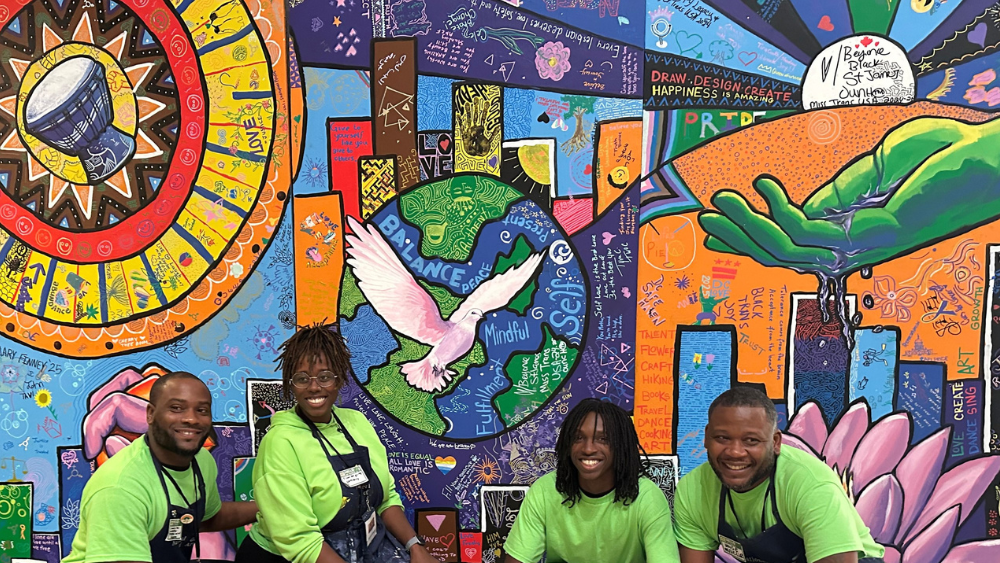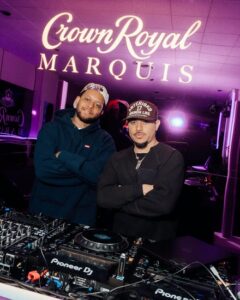


A local artist and her students guided attendees in creating a three-panel mural — Justice, Wellness & Peace, and Radical Joy — over three days at the Human Rights Conference. Hear more about “radical joy” from the event in Episode 4. Photo courtesy of the Human Rights Conference.
At a time when DEI is under attack, how can event professionals make sure their events are inclusive and are places where everyone feels welcome? During Season 8 of the Convene Podcast, we spoke with industry leaders who shared how they are moving forward in the current environment. A practical path emerged — one that prioritizes inclusivity and a sense of belonging regardless of this political moment. Here is what they had to say.
Understanding the Landscape
Dr. Poornima Luthra’s research reveals a psychological truth: Resistance to DEI stems from fear. After two years studying DEI backlash, she found people view diversity initiatives as threats to their status, resources, and understanding of meritocracy. “We create this ‘us versus them [mentality],’ which is why we are where we are,” she told Editor in Chief Michelle Russell.
This fear manifests itself in the events industry. Cameron Curtis, founder and chief innovator of C2 Association Strategies, describes how international attendees are afraid to travel to certain destinations. She gave a few other worrying examples: Some professionals now pause before posting on social media, while organizations scramble to remove DEI language while trying to hold fast to their values.
When I spoke with Natalie Thompson, vice president of diversity, equity, and inclusion at the Capital Pride Alliance, she cut to the chase: “Everything we do is political.” The question isn’t whether to engage with these dynamics, but how to do so effectively.
Design Principles for Belonging
The shift from “diversity” to “belonging” isn’t a matter of semantics — it’s strategic. Curtis articulates the distinction: “Belonging is when I step into that [space where] I feel like I’m on an equal playing field with everybody who is there.”
Devon Montgomery Pasha, the founder of DMP Creative, said there is a difference between changing yourself to fit in and feeling you belong just as you are. This doesn’t happen organically at events, she said, but instead, “belonging is a byproduct of empathy-based planning sessions.” This requires asking registrants better questions — not just about demographics, but about their values and needs.
Frank Wächter, senior digital marketing manager at Congrex Switzerland, talked with me about how inclusivity requires accessibility. “If your website, app, form, or digital touchpoint is not accessible, you have already excluded people before the event begins,” he said. Digital accessibility isn’t an add-on — it’s as foundational as data privacy or mobile optimization.
Thompson shared the approach the Capital Pride Alliance took to balance hard conversations with positivity and celebration at the WorldPride 2025 Human Rights Conference, held in Washington, D.C. in June. “If we are going to be out here fighting the good fight, we also have to make sure that we’re taking care of our health and wellness,” she said. They sandwiched difficult content between joy — opening with celebration, addressing serious topics, closing with performances.
Implementation Strategies
Adam Burke, president and CEO of LA Tourism, spoke about how inclusion drives economic results. Through the Empower LA program, diverse-owned businesses receive tourism readiness training and real opportunities in convention supply chains. “Embracing diversity and inclusiveness makes us a stronger nation, not the reverse,” he said.
For navigating the current climate, these leaders offer practical approaches:
- Language flexibility — Focus on outcomes over terminology. “As long as companies continue doing systemic and cultural change work,” Luthra said, “call it whatever you want.”
- Strategic pressure — Curtis suggests sending RFPs to destinations you cannot choose to host your event based on their states’ restrictive legislation, then provide concrete data about the lost economic impact as a result.
- The power of pause — Montgomery Pasha’s most radical suggestion is to pause and assess. She points to Paramount skipping some of its awards shows for a year to reassess its audience. “If Paramount can do it, we all probably can survive the hit.”
- Keep moving forward — This isn’t about political correctness or following trends. It’s about recognizing that when we design for those who’ve been excluded, everyone benefits, Burke said. “This is lifetime work.”
Magdalina Atanassova is digital editor at Convene.
Listen to the complete Season 8 of the Convene Podcast for full conversations:
- S08 E06: How LA Tourism Champions DEI: Adam Burke on Empowering Small Businesses and Inclusive Growth








